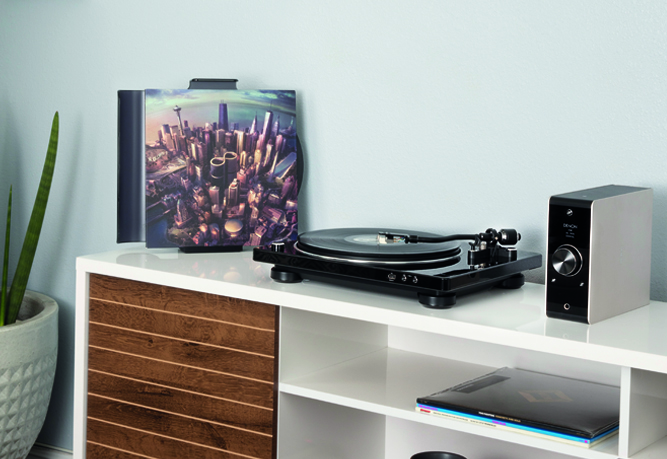Does vinyl beat out other audio formats?

True music fans want to get the best sound quality possible when they're listening to their favourite albums and tracks — that's why they're so committed to only using the very best audio setup possible. High-fidelity audio goes beyond which speakers, sound bars and receivers you use, however. Media format matters, whether you prefer to stream music over the latest mobile apps or still rely on your trusty CD player.
Every audio media has its strengths and weaknesses, and many record friends argue that if you want to capture your favourite songs in all their glory – especially older music from the heyday of rock, folk and R&B — go with a vinyl turntable. Does that always ring true?
Where vinyl turntables have an edge on other formats
There's a reason why we've seen a resurgence in vinyl — and it's not just record hounds snatching up mint-edition Rolling Stones LPs to add to their collections. Yes, there is definitely a tactile element to vinyl's recent popularity, the sense that it's better to hold that record in your hand rather than shuffle through digital tracks. But, there's much more going on here. The argument that "vinyl is how a particular artist was meant to be heard" rings true because a lot of popular music from the '50s, '60s, '70s and even '80s was recorded with vinyl formats in mind.
In contrast, most digital media is compressed to minimize file size so it fits neatly on a variety of devices and can easily transmit across networks. Most of the streaming services simply wouldn't be viable without audio compression technology.
Audio files lose a bit of fidelity when they are compressed though, meaning the listener misses out on sonic details that were painstakingly created when the track was recorded. To the average person, this might not be a big deal, but for music lovers, losing that depth of sound is downright criminal.
However, in both cases, analogue or digital, it always starts with a good recording and what the sound engineer had in mind. If errors have been made right at the beginning it can’t be fixed by one or the other media.
Vinyl provides warmth, avoids 'loudness war'
Vinyl fans always talk about the "warmth" that they get from classic records. This isn't nostalgia talking, but a very real sonic phenomenon. As sound engineer Adam Gonsalves explained, the mid-range sound
you find in vinyl provides a more pleasant, warmer sound for your ears. This is especially noticeable when listening to classic rock artists like the Beatles, Led Zeppelin or Pink Floyd.
Back in the '90s, music labels fought tooth and nail to have their artists heard in stores. That didn't just mean getting their songs played over store PA systems, but making sure that they stood out, grabbed shoppers' attention and drowned out any surrounding noise. This "loudness war" has continued to rage over the years, with recent digital recordings being mastered at higher volumes. Cranking up the decibels in that fashion strains the sound quality, which becomes immediately noticeable if you listen to digital tracks from the 2000s and a vintage LP back-to-back. There's no contest — vinyl just sounds better.
Where digital media wins out
There's an important caveat to the vinyl vs. digital argument that vinyl sounds better in certain circumstances, but not all — especially with newer music. More recent albums released on both vinyl and digital formats are less likely to display any significant difference in sound quality between the two. The tracks were recorded and produced with digital formats in mind and then pressed onto a record. In these situations, vinyl essentially loses its edge.
Furthermore, there are some digital formats available that close, if not outright eliminate, the fidelity gap with older tunes — FLAC, for instance. And as CNET contributor Steve Guttenberg pointed out, digital actually has vinyl beat in a number of areas:
- Stereo separation
- Lower distortion
- Noise floor
- Frequency response
From a convenience standpoint, digital tracks have LPs beat, no contest. Streaming music from your smartphone or mobile device is infinitely easier and more convenient than pulling out records and flipping them over every three or four songs to listen to the other side.
That said, vinyl will always be a completely lossless format, meaning you hear exactly what the artist intended. Ultimately, it's up to the listener to balance out these various nuances and decide what matters most to their listening experience.
If you're serious about listening to your favourite classic artists the way they were meant to be heard and enjoy a more involved listening experience, vinyl is the way to go. There's no denying that digital media has closed the sound quality gap with LPs, though, and the convenience of streaming music and MP3's could be a deciding factor for many music fans. Whatever your preferred format is, be sure to check out all of the great Denon turntables, amplifiers, receivers and other high-quality equipment to get started on your ideal audio setup.
BE THE FIRST TO KNOW
You want to receive news about our products or upcoming promotions? Just sign up to our newsletter now.
Privacy policy
